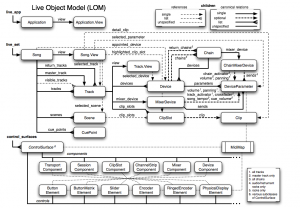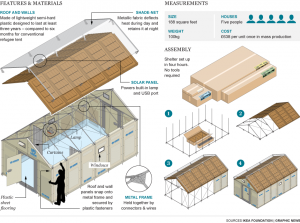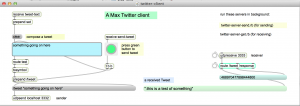http://cycling74.com/docs/max5/refpages/m4l-ref/m4l_live_object_model.html
Max for Live tutorial videos
“Pushing the edit button.”
By Andrew Benson’s at Cycling 74
Shazam clocks ten billion tags
Powers 10% of all digital music sales by figuring out names of songs.
by Janko Roettgers at gigaom.com
http://gigaom.com/2013/09/05/shazam-clocks-ten-billion-tags-powers-10-of-all-digital-music-sales/
Ikea flatpack
Refuge tent for use in Syria.
By Mark Oliver at The Telegraph
Programming Max For Live devices
By Cycling 74
HIghlights
- overview/intro
- * a way to show how many midi notes are being played, using [borax] and build a list of them using [bag]
- how to sync a [phasor~] signal to the Live transport (1 bar)
- transport controlled velocity step sequencer.
- making a midi instrument
- ADSR control of midi instrument
- * filterning with sync to get dubstep bass
- working with buffer~ and samples, and drop
- * [poly~] polyphonic synth : http://cycling74.com/download/polysynthset.zip
- * live API and remote (to control external devices) and live.step, with [phasor~] control
- * parameter sequencer
EP-3xx41 Max – week 1
Design
- People
- Ideas
- Connections
Max patches
- Adam Rokhsar: frame subtraction https://reactivemusic.net/?p=7005
- Little Tikes keyboard controller https://reactivemusic.net/?p=6993 – note: to send Tweets, you will need to download and setup the patches in the internet sensors package: https://reactivemusic.net/?p=5859
[wpdm_file id=3]
Projects
Conversation with robots
https://reactivemusic.net/?p=4710
Frame subtraction remixer by Adam Rokshar
Using video to control audio
Twitter Streaming Radio
https://reactivemusic.net/?p=5786
AR-drone Quadcopter
code not available
The sound of a new machine
https://reactivemusic.net/?p=5945
“Designing Sound” by Andy Farnell. Max examples: Helicopter, TOS transporter,
SynthCar, Jet Engine, Granular Timestretch.
Mira by Sam Tarakajian
The [gizmo~] help file
Demonstration
Little Tikes Piano controller
https://reactivemusic.net/?p=6993
Assignment
Build a control panel in Max. It should look amazing. It should be the coolest control panel you can imagine. Use any objects, colors, shapes that you can find. But… it shouldn’t actually control anything.
Due: Have a first draft on your computer for next week. Final version due before class on 9/23. Email me the Max patch (maxpat) file or a link.
EP-4xx13 DSP – week 1
The Future
- Living In the moment, the past, and the future.
- Benjamin Zander: “Your future self”
- Evolution of music.
DSP
- analyze
- measure
- transform
examples
Note: some of the projects are in project examples below
- Adam Rokhsar’s video frame subtraction
- Little Tikes piano controller
Conversation with robots
https://reactivemusic.net/?p=4710
Twitter Streaming Radio
https://reactivemusic.net/?p=5786
Plink by Dinahmoe
http://labs.dinahmoe.com/plink/#
Infinite Jukebox by Paul Lamere
http://labs.echonest.com/Uploader/index.html
Max/MSP Echonest player
https://reactivemusic.net/?p=6296
The sound of a new machine
https://reactivemusic.net/?p=5945
“Designing Sound” by Andy Farnell.
- Max examples: Helicopter, TOS transporter,
- SynthCar, Jet Engine, Granular Timestretch.
Little Tikes Piano controller
https://reactivemusic.net/?p=6993
Mira by Sam Tarakajian
Ableton Live Template Remixer (with dummy clips)
https://reactivemusic.net/?p=2658
Assignment
Go to the future. Make music. Bring it back to the present.
It should be a very short piece or an excerpt. Less than two minutes. It can be a remix of a song that you believe represents a future direction in music. Near future or distant future – your choice. Use any tools to create the music. The result: an audio file (mp3) or a link to audio or video on the Internet – like Soundcloud or Youtube.
Due: before the 9/23 class. Send an email attachment or link.
Git “Command Not Found” Error In Mountain Lion
Max Twitter client using ruby
Send and receive Tweets using Max via OSC to a background ruby server.
An advantage of this method is that both the patch and the server are compact and easy to understand. The Max patch does things in a Max way. And likewise with the ruby scripts.
download
https://github.com/tkzic/internet-sensors
folder: twitter-ruby
files
Max
- twitter-client.maxpat
ruby
- twitter-server-send.rb (for sending Tweets)
- twitter-server-get.rb (for receiving Tweets)
ruby gems
The ruby script requires installation of the following gems
- json
- osc-ruby
For example:
# sudo gem install twitter
Twitter authorization
In addition to having a Twitter account, you will need to set up a Twitter application from the developer site here:
Good instructions on how to do this can be found in this stackoverflow.com post under this heading: So you want to use the Twitter v1.1 API?
When you get to step 5 – in the instructions – instead of writing your own code, just use a text editor to copy your access tokens into these ruby programs:
- twitter-server-send.rb
- twitter-server-get.rb
Replace the strings in this line of code by copying and pasting the appropriate ones from your Twitter application:
twitterClient = Twitter::REST::Client.new do |config| config.consumer_key = "mqQtoYh16343tDFG3BK7QQ" config.consumer_secret = "X0KexjlK49fhhrnn9EztapZfATCQqWCc5fXVJH2pE" config.oauth_token = "205589709-5krgh9FR3KkLGRDnewiU7GKKBMA6i2La84c" config.oauth_token_secret = "LNARAeooN2vkklkF006GRdihQ5D8YYkm8dYvEs68M" end
instructions
(note: currently running with ruby version 2.0) Display your ruby version by typing: ruby –version
Sending Tweets
- Open the Max patch: twitter-client.maxpat
- In a terminal window run the ruby script:
# ./twitter-server-send.rb
- In the Max patch, type in a Tweet. Press the green button to send.
- When you have tweeted enough, end the ruby server program by typing <ctrl-c>
Receiving Tweets
- Open the Max patch: twitter-client.maxpat
- In a terminal window run the ruby script:
- From Twitter, send a Tweet to the user name embedded in the server
# ./twitter-server-get.rb
Both ruby servers can run at the same time.
What’s next?
- Parse incoming Tweets into various components
- Combine the 2 Ruby servers
revision history
- 5/21/2014 – refactored app names. Added receive server
- 5/19/2004 – moved to twitter-ruby folder
- 1/18/2014 – minor fixes to ruby server for current ruby version 2.0
- 9/7/2013 – uses oauth to communicate directly to Twitter from ruby
Itchy and Scratchy Theme Song
Now THIS is stuck in my head…






